 First edition | |
| Author | Donald Harington |
|---|---|
| Country | American |
| Language | English |
| Genre | Romance novel |
| Published | 1993 |
| Publisher | Harcourt |
| Awards | International IMPAC Dublin Literary Award |
| ISBN | 015128122X |
Ekaterina is a 1993 novel by Donald Harington.
 First edition | |
| Author | Donald Harington |
|---|---|
| Country | American |
| Language | English |
| Genre | Romance novel |
| Published | 1993 |
| Publisher | Harcourt |
| Awards | International IMPAC Dublin Literary Award |
| ISBN | 015128122X |
Ekaterina is a 1993 novel by Donald Harington.
Ekaterina is an exiled Svanetian princess who arrives at an unnamed city at the confluence of the Allegheny and Monongahela, Pittsburgh. There, she gets a job teaching an introductory mycology class at a university. Meanwhile, she rents a room from a woman, Loretta, who lives there with her twelve-year-old son, Kenny, who immediately takes a precocious liking to her. She befriends the 12-year-old boy called Kenny who reminds her of two young pubertal boys she had relationships with in Russia, Islamber and Dzhordzha. Harington describes the attractive boy as a faunlet, a male counterpart to Vladimir Nabokov's nymphet in Lolita.
After two months, the 27-year-old Ekaterina seduces Kenny and they have sex. During the course of their sexual relationship, Kenny, already a juvenile delinquent, steals contraceptives to avoid pregnancy. When Kenny confesses his sexual relationship with Ekaterina after being caught stealing car parts, his mother forces Ekaterina to leave. She settles in town called Stick Around where she befriends a woman named Sharon, who indirectly introduces her to a boy named Jason. Later, she engages Jason on his twelfth birthday by giving him an all-over massage in the bath while baby-sitting him.
With the help of a novelist and improbable creative writing teacher named Ingraham, Ekaterina matures as a writer, eventually publishing not only a successful autobiography, Louder, Engram! (invoking Nabokov's revised autobiography, Speak, Memory), but also several works of fiction, one of which, a novel called Georgie Boy, becomes a bestseller, allowing her to move from "Stick Around," this novel's disguise for Stay More, the primal setting for all of Harington's novels except his first, The Cherry Pit, to a hotel in Arcaty, the novel's counterpart to the real Arkansas Ozarks town of Eureka Springs. In Arcaty, she meets young Travis Coe, another twelve-year-old boy, who moves into her luxurious penthouse apartment as her houseboy. After getting the lice out of his hair, Ekaterina invites Travis into her bed – just twelve days after they meet. Travis turns out to be a considerably more complex presence than his new employer has anticipated, and the relationship does not last. Ekaterina discovers that Travis was not a virgin and kicks him out, becoming obsessed with how he lost his virginity. Travis does go on to star in Hollywood's screen adaptation of Georgie Boy. Ekaterina also benefits by turning her investigation of the girl to whom Travis lost his virginity into a series of short stories that propel her fame further by being published in Playboy magazine.
Ekaterina's relationships with pubescent boys constitute only one facet of this character's ingeniously layered life-story. Donald Harington’s writing is sometimes described as magic realism, but that term hardly begins to suggest the narrative pyrotechnics of Ekaterina, which the author has aptly described as not so much a tribute to Nabokov's Lolita as an apotheosis of it. [1]
The book was reviewed by several news sources such as the Los Angeles Times , [2] Orlando Sentinel , [3] The Washington Post [4] and The New York Times [5] Kirkus Reviews said of the book: "Grand entertainment from an author who's beent too little known for tool long: perhaps this zany homage to Nabokov (especially Lolita) will bring deserved attention to Harrington (sic)'s impressive body of work" while Publishers Weekly said: "Ekaterina is an acknowledged homage to Nabokov, particularly to Lolita, and if it misses some of the Russian master's literary playfulness, it has many charms of its own...". Novelist D. M. Thomas at the Los Angeles Times also called the book " Superbly crafted, foxy, engaging, funny, joyous". [6]
Ekaterina also won a 1996 International Dublin Literary Award. [7]
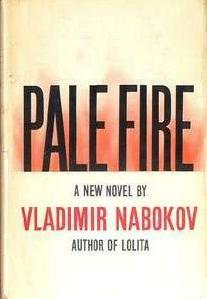
Pale Fire is a 1962 novel by Vladimir Nabokov. The novel is presented as a 999-line poem titled "Pale Fire", written by the fictional poet John Shade, with a foreword, lengthy commentary and index written by Shade's neighbor and academic colleague, Charles Kinbote. Together these elements form a narrative in which both fictional authors are central characters. Nabokov wrote Pale Fire in 1960–61, after the success of Lolita had made him financially independent, allowing him to retire from teaching and return to Europe. Nabokov began writing the novel in Nice and completed it in Montreux, Switzerland.
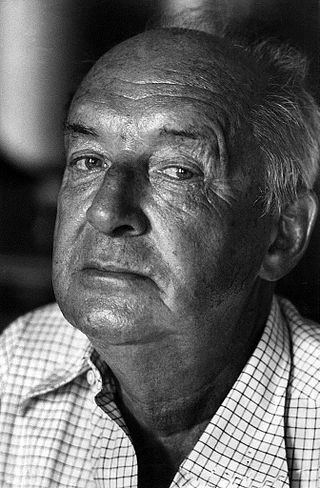
Vladimir Vladimirovich Nabokov, also known by the pen name Vladimir Sirin, was an expatriate Russian and Russian-American novelist, poet, translator, and entomologist. Born in Imperial Russia in 1899, Nabokov wrote his first nine novels in Russian (1926–1938) while living in Berlin, where he met his wife. He achieved international acclaim and prominence after moving to the United States, where he began writing in English. Nabokov became an American citizen in 1945 and lived mostly on the East Coast before returning to Europe in 1961, where he settled in Montreux, Switzerland.
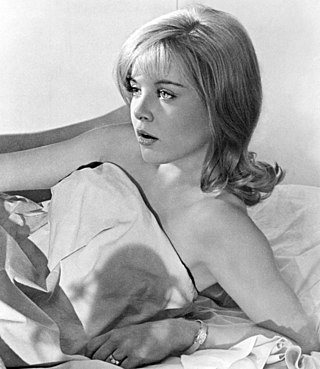
Suellyn Lyon was an American actress who is most famous today for playing Vladimir Nabokov's Lolita in Stanley Kubrick's 1962 film adaptation of Nabokov's eponymous novel, for which she was awarded a Golden Globe.

Azar Nafisi is an Iranian-American writer and professor of English literature. Born in Tehran, Iran, she has resided in the United States since 1997 and became a U.S. citizen in 2008.
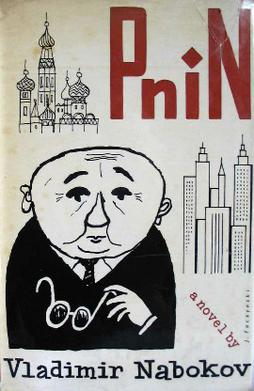
Pnin is Vladimir Nabokov's 13th novel and his fourth written in English; it was published in 1957. The success of Pnin in the United States launched Nabokov's career into literary prominence. Its eponymous protagonist, Timofey Pavlovich Pnin, is a Russian-born assistant professor in his 50s living in the United States, whose character is believed to be based partially on the life of both Nabokov's colleague Marc Szeftel as well as on Nabokov himself. Exiled by the Russian Revolution and what he calls the "Hitler war", Pnin teaches Russian at the fictional Waindell College, loosely inspired by Cornell University and Wellesley College—places where Nabokov himself taught.

The Original of Laura is an incomplete novel by Vladimir Nabokov, which he was writing at the time of his death in 1977. It was published by Nabokov's son Dmitri Nabokov in 2009, despite the author's request that the work be destroyed upon his death.

Lolita is an American 1962 black comedy-psychological drama film directed by Stanley Kubrick based on the eponymous 1955 novel by Vladimir Nabokov.

Lolita is a 1997 drama film directed by Adrian Lyne and written by Stephen Schiff. It is the second screen adaptation of Vladimir Nabokov's 1955 novel of the same name and stars Jeremy Irons as Humbert Humbert and Dominique Swain as Dolores "Lolita" Haze, with supporting roles by Melanie Griffith as Charlotte Haze and Frank Langella as Clare Quilty.
The Real Life of Sebastian Knight is the first English-language novel by Vladimir Nabokov, written from late 1938 to early 1939 in Paris and first published in 1941. A work centred on language and its inability to convey any satisfactory definition, it has been identified as a forerunner of the postmodernist novel.
Lolita, My Love was an unsuccessful musical by John Barry and Alan Jay Lerner, based on Vladimir Nabokov's 1955 novel Lolita. It closed in Boston in 1971 while on a tour prior to Broadway.
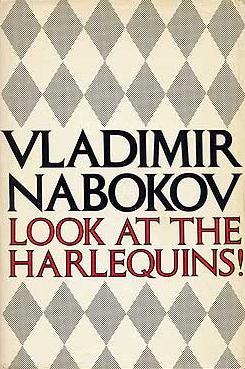
Look at the Harlequins! is a novel written by Vladimir Nabokov, first published in 1974. The work was Nabokov's final published novel before his death in 1977.
"Lolita" is an English-language term defining a young girl as "precociously seductive." It originates from Vladimir Nabokov's 1955 novel Lolita, which portrays the narrator Humbert's sexual obsession with and victimization of a 12-year-old girl whom he privately calls "Lolita", the Spanish nickname for Dolores. Unlike Nabokov, however, contemporary writers typically use the term "Lolita" to portray a young girl who attracts adult desire as complicit rather than victimized.

The Enchanter is a novella written by Vladimir Nabokov in Paris in 1939. As Волшебник (Volshebnik) it was his last work of fiction written in Russian. Nabokov never published it during his lifetime. After his death, his son Dmitri translated the novella into English in 1986 and it was published the following year. Its original Russian version became available in 1991. The story deals with the hebephilia of the protagonist and thus is linked to and presages the Lolita theme.

Lolita is a 1955 novel written by Russian-American novelist Vladimir Nabokov that addresses the controversial subject of hebephilia. The protagonist is a French literature professor who moves to New England and writes under the pseudonym Humbert Humbert. He describes his obsession with a 12-year-old "nymphet", Dolores Haze, whom he kidnaps and sexually abuses after becoming her stepfather. Privately, he calls her "Lolita", the Spanish nickname for Dolores. The novel was originally written in English, but fear of censorship in the U.S. and Britain led to it being first published in Paris, France, in 1955 by Olympia Press.

Lolita (Лолита) is an opera in two acts by composer Rodion Shchedrin. Composed in 1992, it uses a Russian language libretto by the composer which is based on Vladimir Nabokov's 1955 novel of the same name, written in English. The opera premiered in 1994 at the Royal Swedish Opera, Stockholm, using a Swedish language translation of the original libretto.

Lolita is a play adapted by Edward Albee from Vladimir Nabokov's 1955 novel of the same name. The troubled production opened at the Brooks Atkinson Theatre on Broadway on March 19, 1981, after 31 previews and closed after only 12 performances.

A Bad Boy Can Be Good For A Girl is the first novel by Tanya Lee Stone and written in a poetry-format. It follows the story of three girls who fall for the same bad boy intent on seducing every girl in school.

Amity Gaige is an American novelist, known for her books O My Darling, The Folded World, Schroder, and Sea Wife. She is a 2016 Guggenheim Fellow in Fiction. She is currently Lecturer in English at Yale University.

A Fair Maiden is a 2010 novella by Joyce Carol Oates that chronicles the relationship between teenage nanny Katya Spivak and the much older, affluent artist Marcus Kidder. The novel's themes and plot are reminiscent of Vladimir Nabokov's Lolita.

Jamie Bethany Loftus is an American writer, stand up alternative comedian, animator, podcast co-host, and actor based in Los Angeles. She is known for her solo work, such as her one-woman shows I Lost My Virginity on August 15, 2010 and Boss, Whom is Girl. She has also written comedic articles, and written and starred in video content, for media sites such as Adult Swim, Comedy Central, Paste, and Super Deluxe. She was nominated for an Emmy for her work on Robot Chicken in 2020.